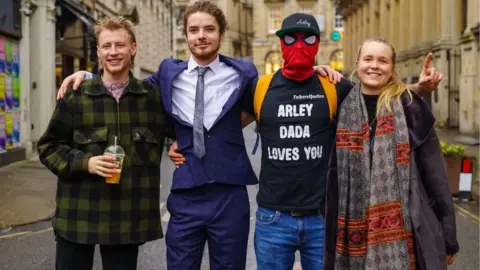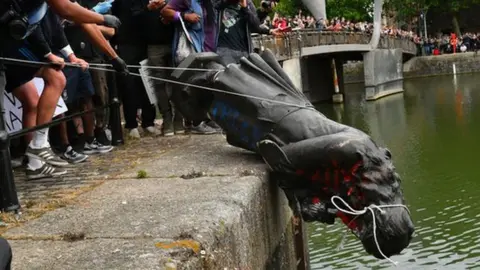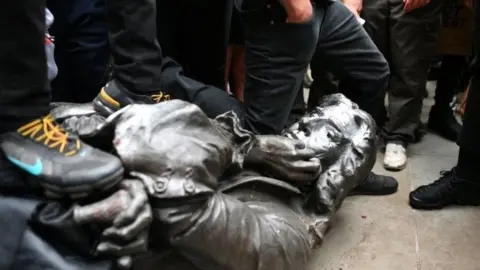Bristol Colston statue toppling was 'violent act', say judges
 PA Media
PA MediaThe toppling of a statue of slave trader Edward Colston was a "violent" act, appeal court judges have ruled.
They also ruled human rights protections were not available as a defence to the so-called Colston Four, who were acquitted of criminal damage.
The appeal comes after then attorney general Suella Braverman referred the case for legal clarification.
Lord Chief Justice Lord Burnett said the ruling does not imply the four were in fact guilty of criminal damage.
Lawyers for the four - Rhian Graham, 30, Jake Skuse, 33, and Sage Willoughby, 22 and Milo Ponsford, 26 - have expressed their disappointment about the judges' verdict.
But Ms Graham said she was "not disheartened" as the ruling would "not overturn a decision made by a jury of our peers".
The four, who are all from Bristol apart from Mr Ponsford, who is based in Hampshire, were charged with criminal damage after the memorial to the Bristol slave trader was torn down on 7 June 2020, but they were cleared at the city's crown court after a trial in January.
 PA Media
PA MediaFollowing the jury's decision, Ms Braverman referred the case to the Court of Appeal, so judges could "clarify the law for future cases" - without affecting the acquittal of the four.
Delivering the judges' ruling, Lord Burnett said the Crown Prosecution Service (CPS) was right to argue the prosecution was not an abuse of process, because the defendants' conduct "fell outside the protection" of the European Convention on Human Rights (ECHR).
However, he emphasised there were other defences used in the trial and it was "impossible to know" on what basis the jury reached its verdict.
 PA Media
PA MediaBut Raj Chada, partner at law firm Hodge Jones and Allen, who represented the four, said: "We are disappointed by the Court of Appeal judgment.
"In our view, the evidence at the trial was that the toppling was not done violently.
"The statue is still on public display as a monument to the evils of the slave trade, not as an obscene glorification of a slave trader."
Lawyers representing the Attorney General's Office had argued that pulling down the statue was "a violent act" involving "significant force".
They said such acts are not covered by the ECHR's freedoms of conscience under article 9, expression under article 10 and association under article 11.
'Protest a fundamental right'
Lord Burnett, sitting alongside Mr Justice Holgate and Mr Justice Saini, agreed and said: "Pulling this heavy bronze statue to the ground required it to be climbed, ropes attached to it and then the use of a good deal of force to bring it crashing to the ground.
"The circumstances in which the statue was damaged did not involve peaceful protest.
"The toppling of the statute was violent. Moreover, the damage to the statue was significant."
However Katy Watts, a lawyer for human rights group Liberty, which made submissions to the appeal hearing, said the ruling was a further example of how "we have seen this government chip away at our protest rights".
"Protest is a fundamental right, not a gift from the state," she said.
"Today's judgment puts a threshold on when people can enact their human rights in a legal case, and takes away vital protections that empower everyone to be able to stand up for what they believe in."
'Oppressor of people'
In a statement issued after ruling Ms Graham, one of the so-called Colston Four, said: "Having been on the ground the day Edward Colston's statue was toppled, I am still confident in saying it was not a violent act.
"It was the cathartic removal of a memorial to an oppressor of people and an abuser of power who had too long loomed over the people of Bristol. The fact that it is gone is still right for Bristol.
"The wider implications of the Court of Appeal's judgment today remain to be seen but I am not disheartened.
"The positive impact of the toppling for both Bristol, and the anti-racism movement as a whole, can never be undone and this judgment cannot overturn the decision made by a jury of our peers."

Follow BBC West on Facebook, Twitter and Instagram. Send your story ideas to: Bristol [email protected]
